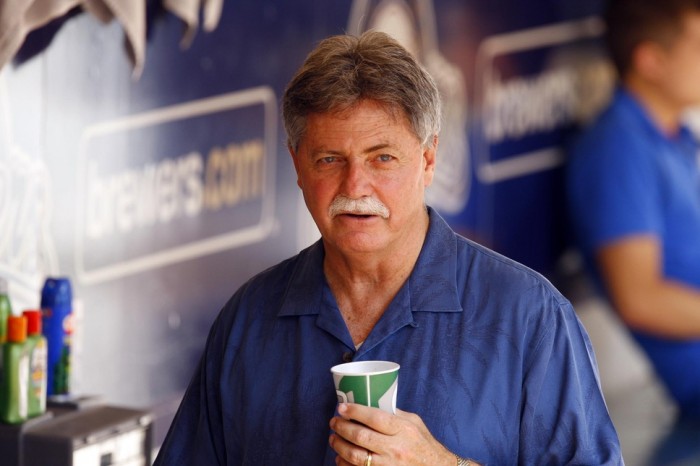As Doug Melvin steps down to an advisory role with the Milwaukee Brewers, it’s clear that an era is in its twilight. But what does that mean for the fans who look retrospectively and forward?
Let’s start first with some fair analysis. During Melvin’s tenure, the Brewers had a win-loss record of 1004-1052. Considering the team he inherited had just come off a 106-loss season, that record isn’t terrible. Even out of context, a record of 48 games under .500 over the course of 13+ seasons is fairly admirable for a small-market club.
Now we move to the unfair analysis, as some may say. According to the Pythagorean record during the Melvin era, the Brewers should have had a 990-1066 record. That’s only one extra loss per season when you space it out, but still, it’s worth mentioning. Furthermore, if the 2015 season ended Tuesday, the Brewers would finish a combined 182.5 games back of first place. That includes the 2011 season when they finished six-games ahead of the second-place St. Louis Cardinals.
It’s clear that winning a pennant was extremely difficult. One could attribute this to many things — the small market of Milwaukee, the difficulty of the NL Central, etc. — but doing so feels like giving management a free pass. During a 13-year span, every team should be able to hope for two first-place finishes. That’s not a lofty goal. Granted, the vast majority of Melvin’s teams played in a six-team division, but that does little to dismiss blame. Melvin’s Brewers finished first one time. They made the postseason twice. In 13 years. And that’s not good.
Every team’s goal on Opening Day is postseason baseball. Once a team reaches that elusive plateau, anything can happen. Just reach it. Unfortunately, the long season is grueling, and baseball excels at weeding out the teams that don’t belong. It’s somewhat intuitive, then, that the only teams that “belonged” in the postseason for the Brewers were the 2011 and 2008 iterations. Their greatest win total with those seasons omitted was only 83, which they matched twice (2007 and 2012). Only two-games above .500 rarely makes the postseason. That is, of course, unless you were a team in the NL West during the 2005 season.
What about the positives, though? There are many. For instance, what about the Brewers’ draft record? From Rickie Weeks in 2003 to Taylor Jungmann in 2011, Melvin’s staff has done pretty well in the first round. Despite what has happened to tarnish his career, a case could be made for Braun being the second-best player drafted in 2005 (behind Andrew McCutchen who was picked 11th). Mix that with Jake Odorizzi, Brett Lawrie, and Jeremy Jeffress and that’s a decently successful tenure. Even Matt LaPorta — even though he didn’t pan out — served the club’s needs as the key piece in obtaining CC Sabathia for the successful 2008 postseason push. That Melvin could garner some value out of even his missed draft picks bodes well for his legacy.
Looking forward, Melvin has seemed to leave the farm system somewhere around the middle of the pack. Derek Harvey recently broke down the landscape, doing a great job of showing the ETAs of prospects in a suddenly healthy system. Despite having a larger amount of legitimate prospects, it remains unclear whether many of them will reach their ceilings. That being said, it could be worse. Melvin could have banked on this team a lot harder and depleted the system pre-season. The club could have refused to trade Yovani Gallardo. This upcoming offseason, Brewers fans should be excited with the potential prospect returns of their remaining tradable assets. I thought the haul for Carlos Gomez and Mike Fiers was a tad underwhelming; however, there’s no reason to think future prospect packages will continue to be so.
Melvin was not great. But he wasn’t terrible, either. Perhaps that fact stings the most. A non-terrible general manager achieves two things. First, he doesn’t get dismissed as quickly due to the existence of more “we were pretty close” years than there were “LIGHT THIS TEAM ON FIRE” seasons. Second, he runs a mediocre team that is often too gun-shy to make flashy deadline moves, ultimately finishing somewhere in the middle and breaking fans hearts. Credit to Melvin for acknowledging the two seasons in which his team was good enough to make those additions, but, sadly, they were too few. A more comprehensive push in 2011 might have been better, but a winning season is a winning season. Revisionist history doesn’t help anyone.
Brewers fans should be slightly excited that Melvin is stepping down. Not because they are now rid of a bad general manager — nothing at all that harsh — but mostly because it’s the beginning of a new era. There are a few blue-chip executives on the unemployment line that may decide to accept Milwaukee as their new employer. Or perhaps they will opt for a fresh face, like with Craig Counsell. Whatever team of executives and managers is assembled for the 2016 campaign, they should provide hope for a team that will build on Melvin’s legacy, but also for a team that might look at the way other teams — such as Houston — have rebuilt. The future seasons only reside in the mind right now. Keep it realistic, and one will be rewarded.

1 comment on “The Legacy of Doug Melvin”